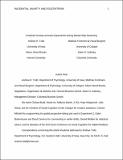| dc.contributor.author | Todd, Andrew R. | |
| dc.contributor.author | Forstmann, Matthias | |
| dc.contributor.author | Burgmer, Pascal | |
| dc.contributor.author | Brooks, Alison Wood | |
| dc.contributor.author | Galinsky, Adam D. | |
| dc.date.accessioned | 2015-05-19T14:23:36Z | |
| dc.date.issued | 2015 | |
| dc.identifier.citation | Todd, Andrew R., Matthias Forstmann, Pascal Burgmer, Alison Wood Brooks, and Adam D. Galinsky. "Anxious and Egocentric: How Specific Emotions Influence Perspective Taking." Journal of Experimental Psychology: General 144, no. 2 (April 2015): 374–391. | en_US |
| dc.identifier.issn | 0096-3445 | en_US |
| dc.identifier.uri | http://nrs.harvard.edu/urn-3:HUL.InstRepos:15786563 | |
| dc.description.abstract | People frequently feel anxious. Although prior research has extensively studied how feeling anxious shapes intrapsychic aspects of cognition, much less is known about how anxiety affects interpersonal aspects of cognition. Here, we examine the influence of incidental experiences of anxiety on perceptual and conceptual forms of perspective taking. Compared with participants experiencing other negative, high-arousal emotions (i.e., anger or disgust) or neutral feelings, anxious participants displayed greater egocentrism in their mental-state reasoning: They were more likely to describe an object using their own spatial perspective, had more difficulty resisting egocentric interference when identifying an object from others' spatial perspectives, and relied more heavily on privileged knowledge when inferring others' beliefs. Using both experimental-causal-chain and measurement-of-mediation approaches, we found that these effects were explained, in part, by uncertainty appraisal tendencies. Further supporting the role of uncertainty, a positive emotion associated with uncertainty (i.e., surprise) produced increases in egocentrism that were similar to anxiety. Collectively, the results suggest that incidentally experiencing emotions associated with uncertainty increase reliance on one's own egocentric perspective when reasoning about the mental states of others. | en_US |
| dc.language.iso | en_US | en_US |
| dc.publisher | American Psychological Association | en_US |
| dc.relation.isversionof | http://dx.doi.org/10.1037/xge0000048 | en_US |
| dash.license | OAP | |
| dc.subject | risk and uncertainty | en_US |
| dc.subject | perspective | en_US |
| dc.subject | emotions | en_US |
| dc.title | Anxious and Egocentric: How Specific Emotions Influence Perspective Taking | en_US |
| dc.type | Journal Article | en_US |
| dc.description.version | Author's Original | en_US |
| dc.relation.journal | Journal of Experimental Psychology: General | en_US |
| dash.depositing.author | Brooks, Alison Wood | |
| dc.date.available | 2015-05-19T14:23:36Z | |
| dc.identifier.doi | 10.1037/xge0000048 | * |
| dash.contributor.affiliated | Brooks, Alison | |


